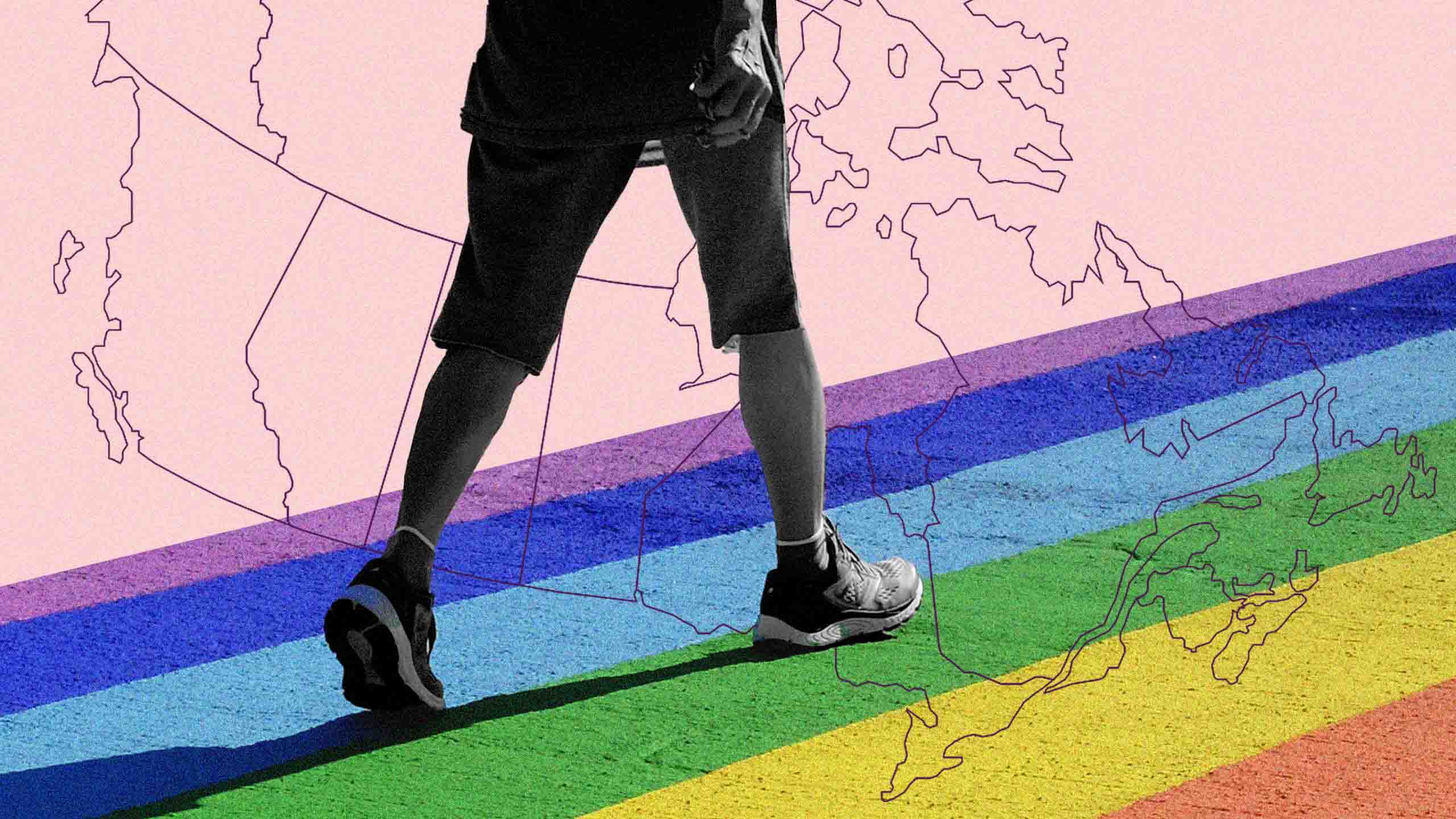When Donald Trump’s administration implemented a resettlement ban in January, refugees intending to move to the U.S. were left with nowhere to go. But thanks to a partnership between Rainbow Railroad and the Canadian government, LGBTQ2S+ refugees previously approved for the U.S. now have the chance to resettle in Canada.
Rainbow Railroad is a non-profit based in the U.S. and Canada that helps LGBTQ2S+ people escape persecution. They supported many LGBTQ2S+ refugees in getting approved for resettlement under the Biden administration. “These are some of our most vulnerable clients. They come from particularly challenging regions, and they definitely need protection and to be resettled,” says Devon Matthews, head of programs at Rainbow Railroad. “Ultimately, the best path forward for us [was] to refer those clients to Canada.”
Since June 2023, Rainbow Railroad has been working with the federal government to identify and refer up to 250 LGBTQ2S+ refugees to Canada’s Government-Assisted Refugees (GAR) program each year. Since the program’s inception, Rainbow Railroad has referred 277 refugees, 57 of whom have resettled in Canada so far. According to Matthews, the partnership was born from six years of “pretty tireless advocacy” and is the first instance in the world where a queer organization has a formalized referral relationship with a government refugee program.
There’s little reliable data on exactly how many refugees identify as LGBTQ2S+, in part because many are reluctant to disclose their identity, particularly those located in countries where being queer or trans is criminalized. Nevertheless, the United Nations Independent Expert on sexual orientation and gender identity describes LGBTQ2S+ migrants as “among the most vulnerable and marginalized people on the move today.”
Matthews explains that LGBTQ2S+-tailored refugee services are important because queer and trans refugees commonly experience discrimination toward their identity when navigating these services. Challenges include a lack of education among immigration officials about LGBTQ2S+ issues, difficulty accessing medical treatment such as gender-affirming healthcare and even outright homophobia or transphobia from employees processing claims.
“Queer and trans refugees often find themselves with little support from their family, society or governments”
Rahma Esslouani relocated to Canada last year through the GAR program, and is now preparing to celebrate their first Pride in Toronto. Having previously experienced harassment, discrimination and state prosecution on account of their non-binary identity in both Turkey and their native Morocco, they know first-hand the hardships that LGBTQ2S+ refugees face. They empathize with the struggles that those redirected from the U.S. are going through.
“It’s really hard, especially when you are suffering in your home country and you go to another country, and then in this country, the same thing [happens],” they say, adding that queer and trans refugees often find themselves with little support from their family, society or governments.
Matthews says that while it’s useful to have these pathways for at-risk LGBTQ2S+ refugees to resettle in Canada, the process of being redirected from the U.S. has been very disruptive to those affected.
“These individuals were awaiting resettlement in one country and thinking that travel was imminent, and now are going back to the queue in a very lengthy process to potentially be resettled to an entirely different country,” they explain. “It would have been obviously better for their lives and their stability for them to have been able to follow through on their original plans.”
Resettlement in Canada is not necessarily quick. People applying for refugee status in Canada face long wait times as their applications are processed. In 2023, the processing time for the GAR program was 25 months, and over 30 months for other pathways such as private sponsorship. Matthews says the long wait times are the biggest challenge facing Rainbow Railroad’s clients.
“We are working with particularly vulnerable LGBTQ+ people who are in settings that they cannot—[and] if they can, barely—survive for any period of time, let alone the years that it can take to go through not only the arduous application process, but also then the significantly lengthy process of evaluating that application,” they tell Xtra.
Esslouani concurs, adding that LGBTQ2S+ refugees live in situations where they cannot be themselves without risking discrimination, assault, bullying and physical or verbal violence.
“According to my experience and the people that I know, there is no life and there is no security or safety or dignity that we can live there,” she says.
Esslouani also reports that refugees face difficulty finding housing and employment once arriving in Canada. The governments of Canada and Quebec currently offer support to refugees such as accommodation, food, clothing, financial assistance and help finding employment. Nevertheless, she believes that newcomers could benefit from further support from the government to integrate into Canadian society.
“It’s such a personal thing, queerness. It’s not something that is easily proved in paper or in a quick process.”
At the moment, Matthews says that Rainbow Railroad is very concerned about Canada’s Bill C-2. The widely condemned bill would prevent people from seeking asylum more than 14 days after crossing the U.S.-Canada border between checkpoints or over a year after their first entry into Canada. The bill would also limit the window to appeal an asylum denial to 15 days from the notice of rejection. According to Matthews, this is particularly problematic for LGBTQ2S+ refugees who commonly face difficulty procuring documents to prove their queer or trans identity to immigration officers.
“It’s such a personal thing, queerness,” explains Matthews. “It’s not something that is easily proved in paper or in a quick process.”
LGBTQ2S+ people seeking asylum have to prove both their identity and that they face persecution on account of it. Documents proving this can include proof of involvement in LGBTQ2S+ events, letters from former romantic or sexual partners, police records of violence or harassment, or medical records of injuries from homophobic or transphobic violence. Many of these documents could be dangerous for an LGBTQ2S+ individual to travel with, and could risk outing others in their home country.
As it stands, Bill C-2 would not affect LGBTQ2S+ refugees resettled under the GAR program as processing happens while applicants are overseas. However, Rainbow Railroad works with clients who enter the country through many different mechanisms that would be negatively affected.
Ultimately, Matthews believes that Bill C-2 contradicts Canada’s supposed commitment to human rights leadership. They argue that Canada has a responsibility to both uphold LGBTQ2S+ rights and reject “xenophobic, anti-immigrant, anti-refugee rhetoric” taking hold across the world.
“[Canada] needs to continue to set the precedent for how human rights are upheld in Canada despite what’s going on south of the border,” says Matthews. “Being a leader in human rights means also ensuring safe passage of people who have faced a denial of those human rights.”


 Why you can trust Xtra
Why you can trust Xtra


